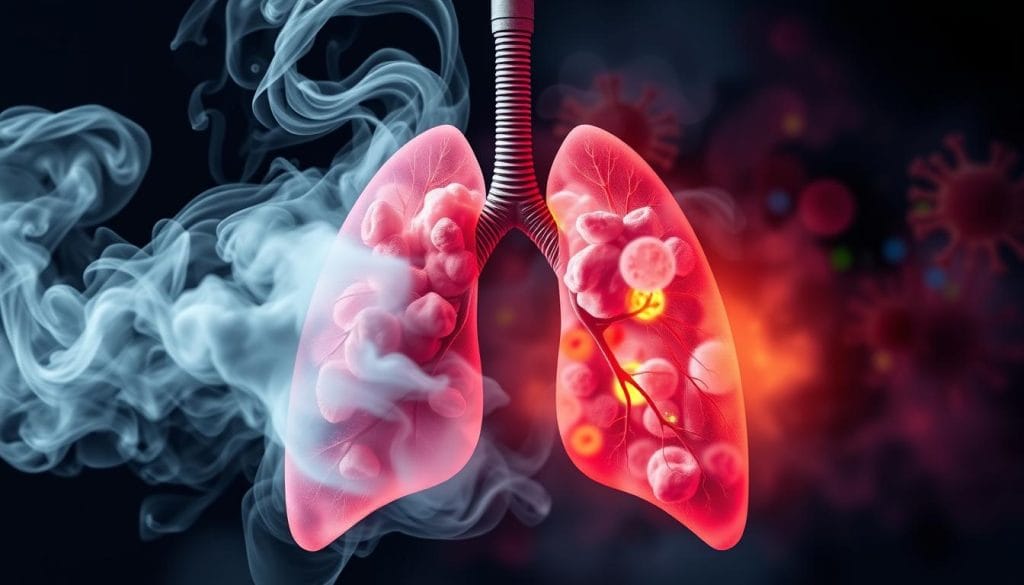When a cough echoes through the room, a common question often follows: “Is bronchitis contagious?” It’s a valid concern that touches on the complex nature of bronchitis transmission. The whispers of contagious bronchial infection raise alarm bells, as it pertains not just to personal health, but also to the well-being of the community. In scrutinizing the bronchitis communicability, we shed light on this respiratory condition’s potential to spread, paving the way for a deeper exploration into its transmission mechanisms.
This article aims to simplify the complex world of bronchitis and its contagious nature. We start a journey to clear up the confusion around bronchitis. Our goal is to provide a clear and detailed view that everyone wants to know. Welcome to a journey through facts, shedding light on one of the most frequently asked questions in respiratory health.
Key Takeaways
- Understanding whether bronchitis is contagious and its implications on public health.
- Insights into the different factors that affect bronchitis transmission.
- Identifying the role of pathogens in contagious bronchial infection.
- An introduction to the considerations on bronchitis communicability.
- Setting the scene for a comprehensive analysis of bronchitis contagion.
Exploring the Basics of Bronchitis
Bronchitis is a common respiratory condition that affects many people. Knowing how it works is key to preventing and managing it.
What is Bronchitis?
Bronchitis is when the bronchial tubes, the airways to the lungs, get inflamed. This leads to a lot of mucus and bronchitis symptoms that make breathing hard.
Types of Bronchitis: Acute and Chronic
There are two main types of bronchitis: acute bronchitis and chronic bronchitis. Acute bronchitis is often caused by viruses or bacteria and gets better in a few weeks. Chronic bronchitis, a part of COPD, is caused by long-term exposure to harmful substances like tobacco smoke. It has ongoing symptoms.
Symptoms of Bronchitis
The main bronchitis symptoms are a persistent cough and mucus production. You might also feel tired, have trouble breathing, and have a slight fever. Knowing these symptoms helps catch bronchitis early.
Smoking and pollution can lead to chronic bronchitis. Public health education and medical checks are important to understand this.
Acute bronchitis spreads when someone coughs a lot, releasing the virus or bacteria into the air. This can infect others. Knowing this helps us take steps to prevent it.
| Types of Bronchitis | Causes | Common Symptoms | Duration of Illness |
|---|---|---|---|
| Acute Bronchitis | Viral infections, bacterial infections | Cough, mucus production, fatigue | 1-3 weeks |
| Chronic Bronchitis | Long-term exposure to irritants like tobacco smoke | Cough, mucus production, breathing difficulty | Ongoing, with periods of worsening symptoms |
Learning about bronchitis helps us fight it with better health care and lifestyle choices. Spotting symptoms early means we can get help fast and avoid chronic problems.
Understanding How Bronchitis is Contracted
It’s important to know how bronchitis spreads to prevent and treat it. This disease is caused by viruses and bacteria. We’ll look at how these pathogens spread and how to avoid getting bronchitis.
- Airborne Droplets: When someone with bronchitis coughs or sneezes, they release droplets. These droplets can stay in the air or land on surfaces, waiting to be touched.
- Direct Contact: Sharing utensils, kissing, or touching an infected person can spread the disease.
- Contaminated Surfaces: Touching surfaces with pathogens and then touching your face can cause infection.
Knowing how bronchitis spreads shows why good hygiene and careful interaction are key. This is especially true in places where respiratory illnesses are common.
| Transmission Method | Risk Level | Preventive Measures |
|---|---|---|
| Airborne Droplets | High | Wear masks, maintain social distancing |
| Direct Contact | Medium | Avoid sharing items, direct contact with sick individuals |
| Contaminated Surfaces | Low to Medium | Regular hand washing, use of sanitizers, disinfect frequently touched surfaces |
Talking about catching bronchitis often focuses on its contagious nature. To lower the risk, wash hands often, wear masks, and practice good respiratory hygiene.
Is Bronchitis Contagious?
Many people wonder if bronchitis is contagious. The answer depends on the type of bronchitis. Acute bronchitis, caused by viruses or bacteria, is contagious. Chronic bronchitis, linked to smoking or pollution, is not.
Bronchitis contagion happens like colds or flu. When someone with bronchitis coughs or talks, they spread tiny droplets. These droplets can infect others nearby. Knowing if is bronchitis contagious helps prevent it, especially in the cold months.
Let’s dive into the contagious bronchial infection rates and what to consider:
- Acute bronchitis is very contagious, especially if it’s caused by common cold or flu viruses.
- Those with weak immune systems, the elderly, and kids are more likely to catch bronchitis.
- Chronic bronchitis, part of COPD, isn’t contagious but can worsen with pollutants and viruses.
To stop acute bronchitis from spreading, wash hands often, stay away from sick people, and cover your mouth and nose when coughing or sneezing. These steps help fight off infections that cause bronchitis.
To sum up, bronchitis itself isn’t always contagious. But the germs that cause it can be. So, while is bronchitis contagious is “yes” for acute cases, chronic bronchitis is not contagious.
The Role of Bacteria and Viruses in Bronchial Infections
Exploring bronchitis transmission reveals the key roles of bacteria and viruses. Knowing the difference between bacterial and viral infections helps in diagnosis and treatment. This knowledge is crucial for managing bronchitis effectively.
Differentiating Between Bacterial and Viral Bronchitis
Bacterial bronchitis has more severe symptoms than viral bronchitis. Bacteria like Streptococcus pneumoniae and Haemophilus influenzae cause it. They lead to thick, discolored mucus.
Viral bronchitis, however, feels like a cold or flu. Viruses like the influenza virus or RSV cause it. Treatment for viral bronchitis focuses on symptom relief as the body heals itself.
Identifying Pathogens That Cause Bronchitis
To grasp bronchitis transmission, identifying pathogens is key. Here’s a quick comparison:

| Type of Bronchitis | Common Pathogens | Typical Symptoms |
|---|---|---|
| Bacterial Bronchitis | Streptococcus pneumoniae, Haemophilus influenzae | Severe cough, Yellow/green mucus |
| Viral Bronchitis | Influenza virus, Respiratory syncytial virus (RSV) | Lighter cough, Clear mucus, Flu-like symptoms |
Knowing if bronchitis is bacterial or viral is vital. It guides treatment and prevention, leading to better health and reduced transmission risk.
Factors Influencing Bronchitis Contagion
It’s important to know what makes bronchitis spread. We need to look at how our immune system susceptibility works and the bronchitis environmental factors. This helps us understand bronchitis communicability better.
Immune System and Susceptibility
Our immune system is key in fighting infections, like bronchitis. A strong immune system lowers the risk of getting bronchitis and makes it less severe. But, people with weak immune systems are more at risk.
Staying healthy is crucial. This means getting enough sleep, eating well, and exercising regularly. These habits help keep our immune system strong and fight off infections.
Environmental Factors That Foster Transmission
Environmental conditions greatly affect how bronchitis spreads. Cold weather makes us stay indoors more, which increases the risk of getting sick. Air pollution and crowded places also raise the risk of bronchitis.
Keeping indoor spaces well-ventilated is important. It helps reduce the risk of getting bronchitis. Also, try to avoid polluted air as much as possible.
For more tips on how to prevent bronchitis and when it’s safe to be around others, check out this useful guide. It offers advice on managing symptoms of respiratory viruses, including bronchitis.
| Factor | Impact | Preventive Measure |
|---|---|---|
| Weak Immune System | High Risk of Infection | Maintain a healthy lifestyle |
| Cold Weather | Increases indoor interaction | Ensure proper indoor ventilation |
| Air Pollution | Elevates transmission risks | Limit exposure to polluted environments |
| Population Density | Higher contagion possibility | Avoid crowded places |
Preventive Measures Against Bronchitis Transmission
Fighting respiratory illnesses means knowing how to stop bronchitis. By following certain health tips, we can cut down on bronchitis spread. Here are key ways to prevent bronchitis and keep our surroundings healthy.
- Maintain rigorous hygiene: Washing hands often and using sanitizers can greatly lower virus and bacteria spread.
- Avoid close contact with infected individuals: Staying away from those with bronchitis symptoms reduces airborne transmission risk.
- Use masks in crowded places: Wearing masks in busy areas during cold and flu season can stop infectious droplets.
- Immunization: Getting flu and pneumococcal vaccines yearly is advised by doctors to lower bronchitis risk.
- Optimize indoor air quality: Using air purifiers and keeping HVAC systems clean can reduce pathogen spread.
- Embrace a healthy lifestyle: Exercise, a balanced diet, and enough sleep boost immunity against infections.
Let’s look at how well these steps work in the table below. It shows the impact of each on reducing bronchitis transmission.
| Preventive Measure | Effectiveness | Recommended By |
|---|---|---|
| Hand Hygiene | High | CDC |
| Social Distancing | Medium to High | WHO |
| Masks | Medium | National Health Service |
| Vaccinations | Varying – High for Vulnerable Groups | Various Health Authorities |
| Air Quality Control | Medium | EPA |
| Healthy Lifestyle Choices | Medium | Multiple studies and health experts |
By taking these bronchitis preventive steps, we can all help reduce bronchitis transmission. This makes our communities safer and healthier.
Assessing Bronchitis Spreadability in Public Places
It’s important to know how bronchitis spreads in places like schools and workplaces. This knowledge helps in managing and preventing the disease. In crowded areas, the risk of bronchitis is higher.
How Bronchitis Spreads in Schools and Workplaces
Schools are key in stopping bronchitis spread because students are often close together. Places like classrooms, cafeterias, and buses are where germs can spread easily. This makes it crucial to take strong preventive steps.
- Regular sanitization of shared spaces and objects
- Encouraging frequent handwashing and the use of hand sanitizers
- Implementation of sick leave policies to discourage attendance while symptomatic
Risks Associated with Crowded Areas
Places like public transport, shopping centers, and offices are risky for spreading respiratory diseases. The risk of bronchitis is higher in crowded areas, especially during busy times or in places with bad air. To reduce risks, consider these strategies:
- Maintaining good air circulation through ventilation systems
- Limiting the number of people in an enclosed area at any given time
- Education on respiratory health and etiquette
Talking about bronchitis in public places helps control its spread. It also teaches people about important health habits.
Who Is at Higher Risk of Catching Bronchitis?
It’s important to know who is more likely to get bronchitis. This helps prevent outbreaks and gives better healthcare. Age and how well the immune system works are key factors.
High-Risk Groups for Contagious Bronchial Infections
Knowing who is at high risk helps us focus our health efforts. People with lung problems, smokers, and those with weak immune systems are at higher risk. Living in crowded places or areas with lots of pollution also makes you more likely to get bronchitis.
Children and the Elderly: Varying Degrees of Vulnerability
Children and the elderly are especially at risk of getting bronchitis. This is because their immune systems are still growing or weakening. Children and elderly bronchitis cases can be very serious because they often have worse symptoms and problems.
Children: Their immune systems are still growing, making it harder to fight off bronchitis. Their airways are also smaller and more likely to get blocked or inflamed.
The elderly: Older adults have weaker immune systems and may have other health problems that make bronchitis worse. They also have less lung capacity and struggle to clear out bacteria.
| Age Group | Common Risk Factors | Preventive Measures |
|---|---|---|
| Children | Developing immune system, exposure to germs in schools | Frequent handwashing, avoiding secondhand smoke |
| Elderly | Weakened immune system, chronic health conditions | Influenza vaccination, avoiding crowded places during flu season |
This table shows the different ways we need to care for these vulnerable groups. By protecting them, we can lower the number of bronchitis cases and make them less severe.
Diagnosing Contagious Bronchitis
Finding out if you have contagious bronchitis takes a detailed look. It involves checking your symptoms and doing specific tests. This helps doctors know if you have bronchitis and if it’s contagious. It’s important to stop it from spreading.
Doctors start by looking at your history and doing a physical check. They look for signs like a long cough, wheezing, and sputum. They also check if you’ve been around sick people recently.
After the first check, doctors do more tests to be sure:
- Chest X-rays: This test shows how your lungs are doing. It can spot problems that might mean you have bronchitis.
- Sputum Tests: Looking at the mucus you cough up can tell a lot. It helps find out what’s causing your bronchitis. This helps doctors choose the right treatment.
In the end, quick and right bronchitis testing is key. It helps manage the disease and stop it from spreading. Every step is taken with your health in mind, making sure you get the best care.
Understanding the Bronchitis Infectious Period
Knowing how contagious bronchitis is helps stop it from spreading. The infectious period of bronchitis changes based on the cause, whether it’s a virus or bacteria. This part explains the stages of bronchitis and how long it lasts to know when someone is still contagious.
Stages of Bronchitis and Communicability
Bronchitis starts with a severe phase. Symptoms like coughing, mucus, and fever are at their peak. This is when it’s most contagious.
As the body fights off the infection, symptoms lessen. The risk of spreading the virus also goes down. Knowing this timeline helps keep others safe and start treatments on time.
How Long Does Bronchitis Remain Contagious?
The bronchitis communicability timeline varies by the cause. Viral infections, the most common, make you contagious a few days before symptoms start. You stay contagious for about a week after symptoms appear.
If you keep coughing, you can still spread it. Bacterial bronchitis might need antibiotics. People with bacterial bronchitis are usually not contagious after 24-48 hours of treatment.
Things like your immune system, age, health, and environment also affect how long bronchitis lasts. It’s vital to follow doctor’s orders and practice good hygiene. This includes washing hands often and wearing masks if needed.
Understanding your condition and knowing when you’re contagious is crucial. It helps manage the illness and stops it from spreading in your community.
Treatment Options for Contagious Bronchitis
Understanding how to treat contagious bronchitis is key. It’s important to know if it’s caused by a virus or bacteria. Treating bronchitis well means using medicine for bacteria and home remedies for viruses.
Antibiotics and Bronchitis: When Are They Effective?
Bronchitis antibiotics are for bacterial infections. They don’t work on viruses and can cause resistance. Antibiotics are not always needed for viral bronchitis.
But, in severe bacterial cases, antibiotics are used. They help prevent more infections and complications.
Home Remedies to Alleviate Symptoms
For viral bronchitis, home remedies for bronchitis can help. These include:
- Staying hydrated to loosen mucus.
- Using a humidifier to clear breathing passages.
- Drinking honey in warm tea to soothe the throat.
- Doing gentle breathing exercises to improve lung capacity.
These remedies ease symptoms but don’t cure bronchitis. They support the body while it recovers from a virus.
Complications and Risks of Untreated Bronchitis
It’s key to know the risks of untreated bronchitis to manage and prevent serious bronchitis complications. These issues can worsen health and impact daily life and overall health.
Untreated bronchitis can turn from a minor issue to a serious health risk. It may lead to pneumonia or chronic obstructive pulmonary disease (COPD). Recognizing these dangers shows why early medical care is vital.
“Prompt treatment of bronchitis not only helps alleviate symptoms more quickly but also mitigates the risk of developing more severe respiratory conditions.”
Table: Overview of Potential Bronchitis Complications
| Complication | Description | Associated Risks |
|---|---|---|
| Pneumonia | Severe inflammation and infection of the lungs | Increased hospitalizations, higher medical costs |
| Chronic Bronchitis | Long-term inflammation of the airways | Chronic respiratory distress, reduced lung function |
| Respiratory Failure | Inability of the lungs to perform gas exchange | Potential for mechanical ventilation, intense medical care |
| Acute Respiratory Distress Syndrome (ARDS) | Lung condition causing severe shortness of breath | High mortality rate, prolonged hospital stay |

Quick action in treating bronchitis can ease symptoms and lower risks of untreated bronchitis. Early treatment, whether for a virus or bacteria, can stop these severe bronchitis complications and help you recover faster.
The Myth of Chronic Bronchitis Virulence
There’s a common chronic bronchitis myth that it’s as contagious as acute bronchitis. This section aims to clear up that chronic bronchitis virulence misconception. It shows the big differences between acute and chronic bronchitis. Chronic bronchitis is usually non-contagious bronchitis.
Distinguishing Between Contagious and Chronic Conditions
Acute bronchitis often comes from viruses or bacteria and is contagious, especially early on. This is different from chronic bronchitis, which is part of COPD. It develops from long-term exposure to irritants like smoke or pollution, not from infections.
This key difference is important. It helps us understand why one type is contagious and the other isn’t.
Understanding Why Chronic Bronchitis Isn’t Contagious
Chronic bronchitis causes long-term inflammation in the bronchial tubes, leading to a persistent cough. This might seem like infectious bronchitis, but it’s not. The inflammation comes from the lungs reacting to irritants, not from pathogens that spread from person to person.
Chronic bronchitis has symptoms that come back for months or years. This is different from acute bronchitis, which has shorter infectious periods. This lasting nature shows that chronic bronchitis is not contagious. It proves it’s not as contagious as other respiratory diseases.
Conclusion
As we conclude this guide, it’s clear that knowing about bronchitis is key. Understanding how it spreads is crucial. We’ve talked about how to stop it from spreading.
By knowing who’s most at risk, we can help keep everyone safe. This guide has shown us how important it is to stay informed. It’s all about being aware and taking care of our health.
We’ve covered how bronchitis is caught and the dangers it poses. We’ve also looked at ways to prevent it and treat its symptoms. This is important for everyone, especially those who are more vulnerable.
Preventing bronchitis is a team effort. By being aware and making smart health choices, we can all help. We want everyone to be able to take care of their respiratory health.
FAQ
Is bronchitis contagious?
Yes, bronchitis can spread, especially if it’s caused by a virus or bacteria. It can spread through the air when someone coughs or sneezes. It can also spread through touching contaminated surfaces.
What is bronchitis?
Bronchitis is when the airways to the lungs get inflamed. This can cause coughing, mucus production, and breathing trouble.
What are the types of bronchitis?
There are two main types of bronchitis. Acute bronchitis is usually caused by infections and lasts a short time. Chronic bronchitis is a long-term condition often caused by smoking or environmental factors.
How is bronchitis contracted?
Bronchitis is often caught by breathing in viruses or bacteria. This can happen through coughs or sneezes of sick people. It can also spread through touching things that have the virus or bacteria on them.
Are bacteria and viruses both responsible for causing bronchitis?
Yes, both can cause bronchitis. Viruses are the main cause of acute bronchitis. Bacteria can also cause it, leading to more serious symptoms.
Can your body’s immune system affect your susceptibility to bronchitis?
Absolutely. A strong immune system can fight off infections, including bronchitis. A weak immune system makes it easier to get sick with bronchitis.
What environmental factors can influence bronchitis transmission?
Pollution, cold weather, and poor air can make bronchitis spread easier. These factors help pathogens move around more.
How can the transmission of bronchitis be prevented?
To stop bronchitis from spreading, wash your hands often. Cover your mouth when you cough or sneeze. Get vaccinated if you can. Stay away from people who are sick.
Who is at a higher risk for catching bronchitis?
Some people are more likely to get bronchitis. This includes kids, the elderly, people with weak immune systems, smokers, and those with lung problems.
How is contagious bronchitis diagnosed?
Doctors diagnose contagious bronchitis by checking symptoms and doing tests. They might use chest X-rays or sputum tests to find the cause.
What is the infectious period for bronchitis?
The time when someone with bronchitis is most contagious varies. They are usually most contagious in the first few days. But they can still spread it as long as they’re coughing and have symptoms.
What treatments are available for contagious bronchitis?
For bacterial bronchitis, doctors might give antibiotics. For viral bronchitis, rest, drinking lots of fluids, and over-the-counter meds can help.
What complications can arise from untreated bronchitis?
Untreated bronchitis can lead to serious problems. These include pneumonia, COPD, and other lung issues, especially in people who are already sick.
Can chronic bronchitis be contagious?
No, chronic bronchitis is not contagious. It’s usually caused by long-term irritation, like from smoking, not from an infection.

















